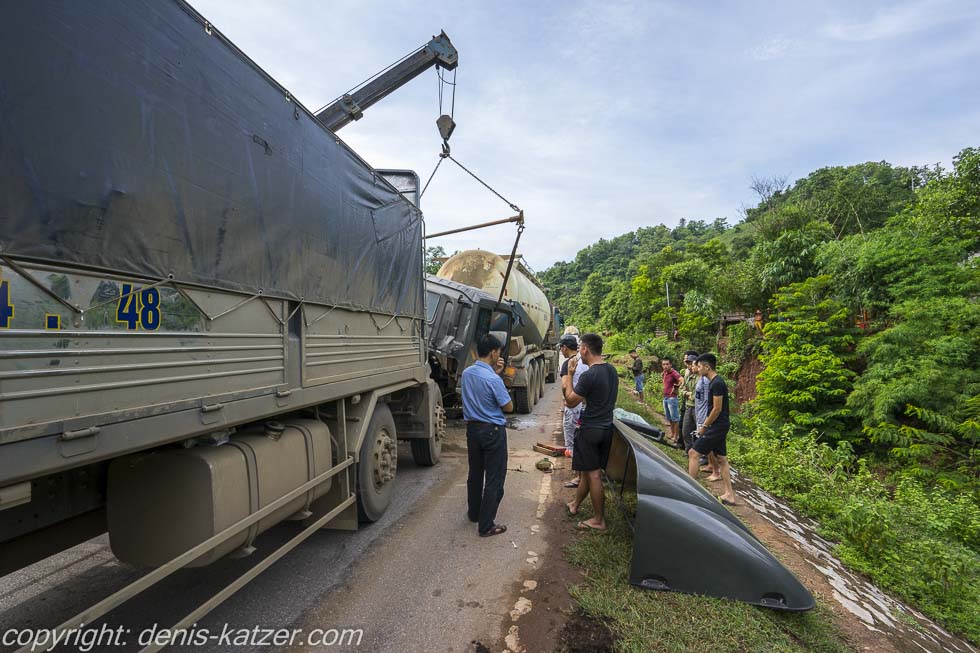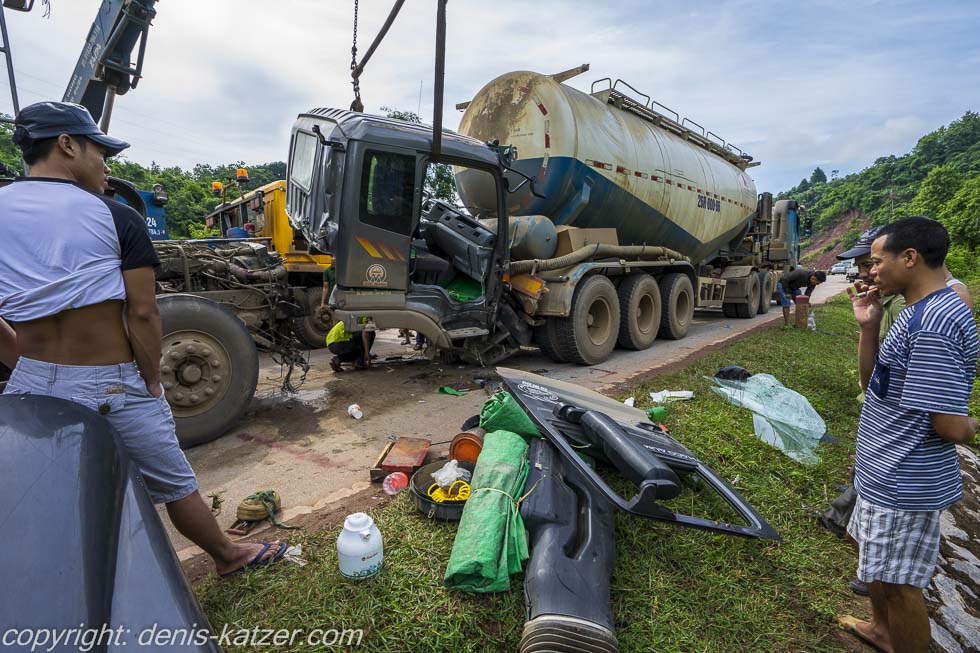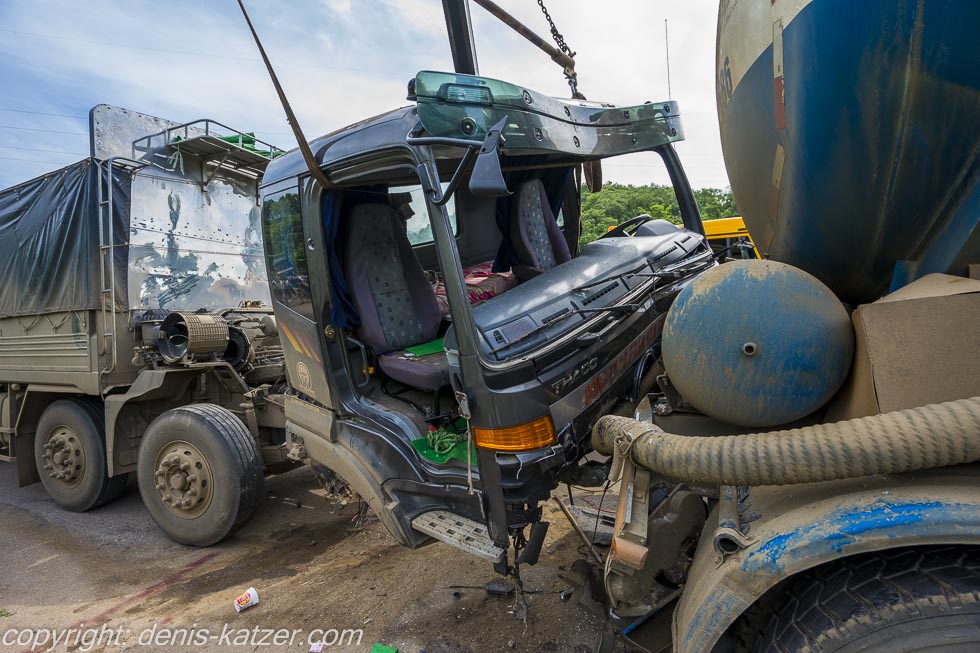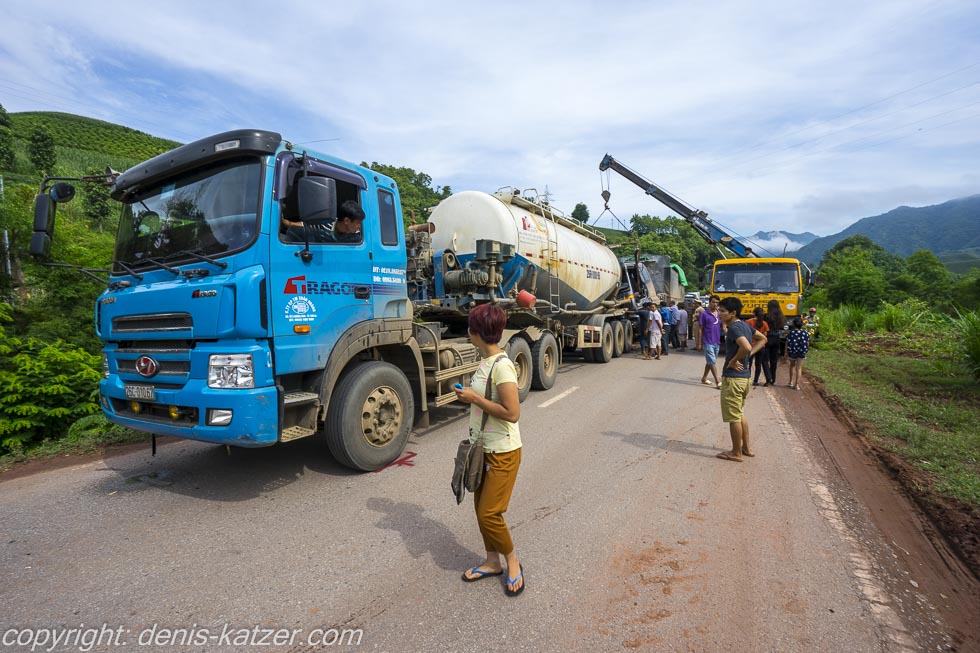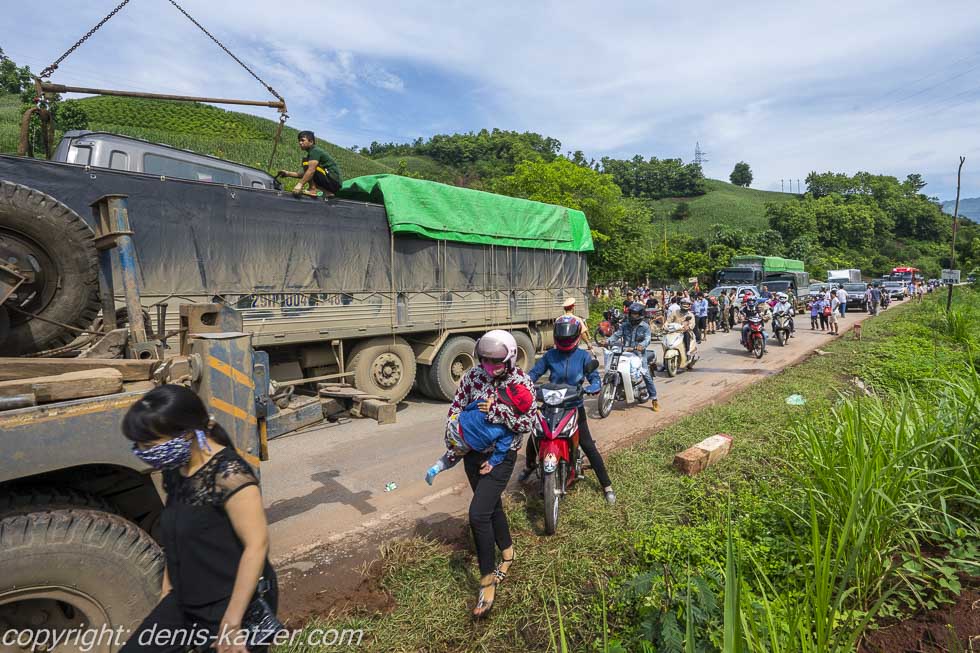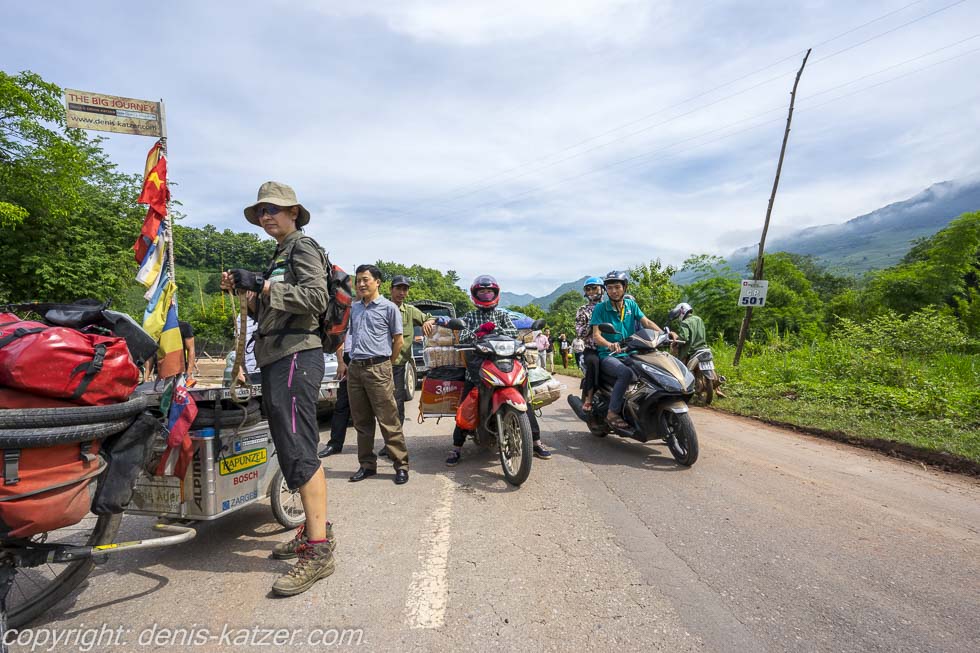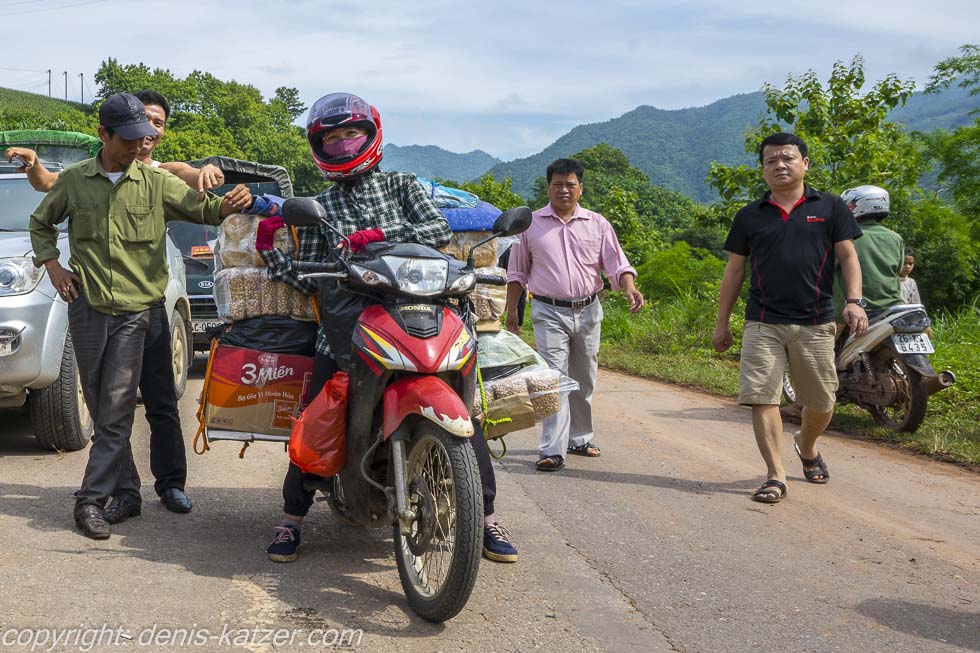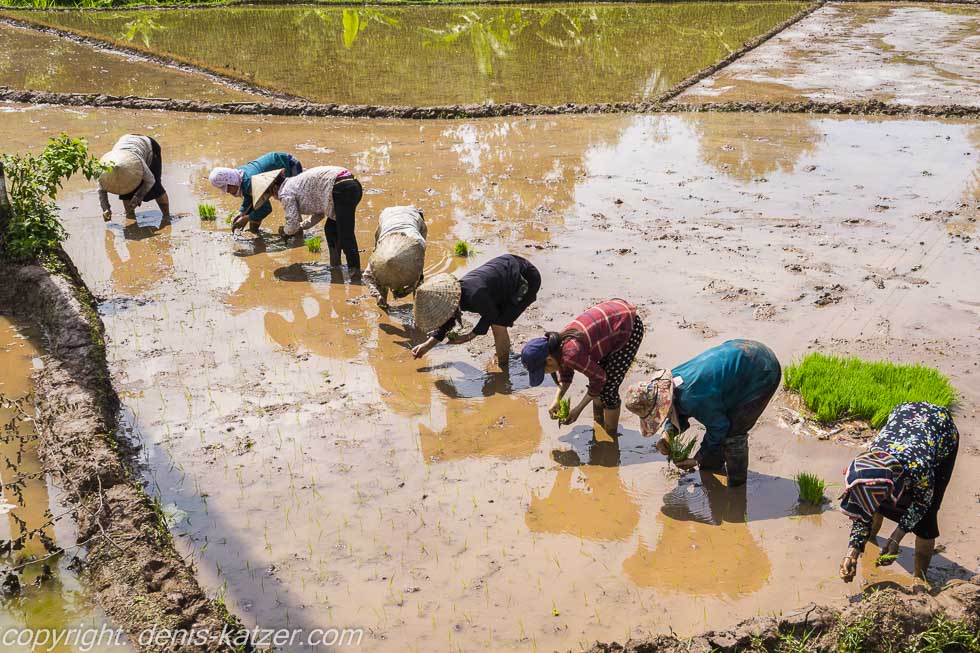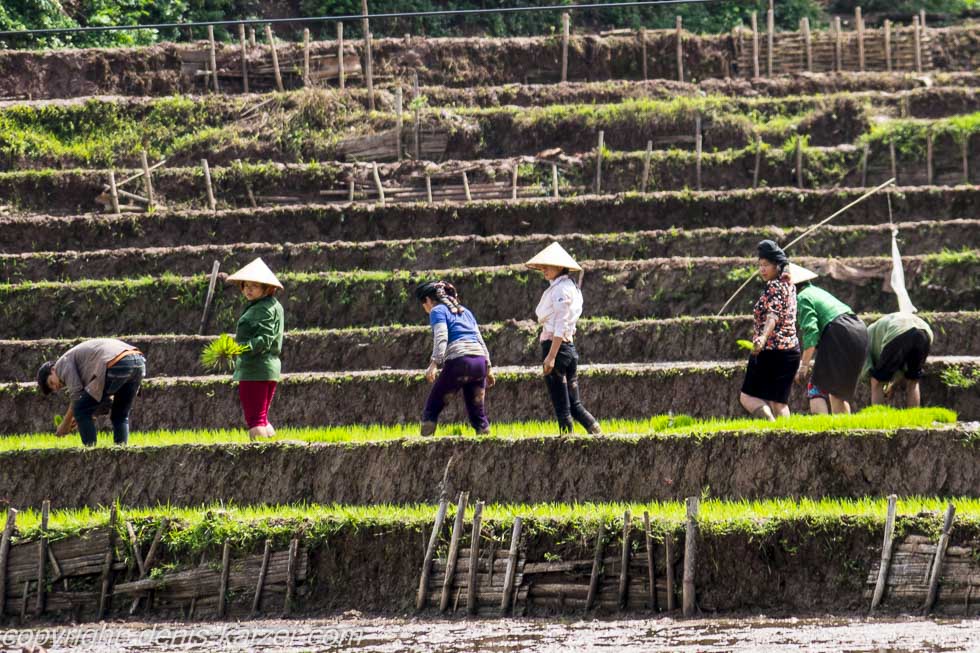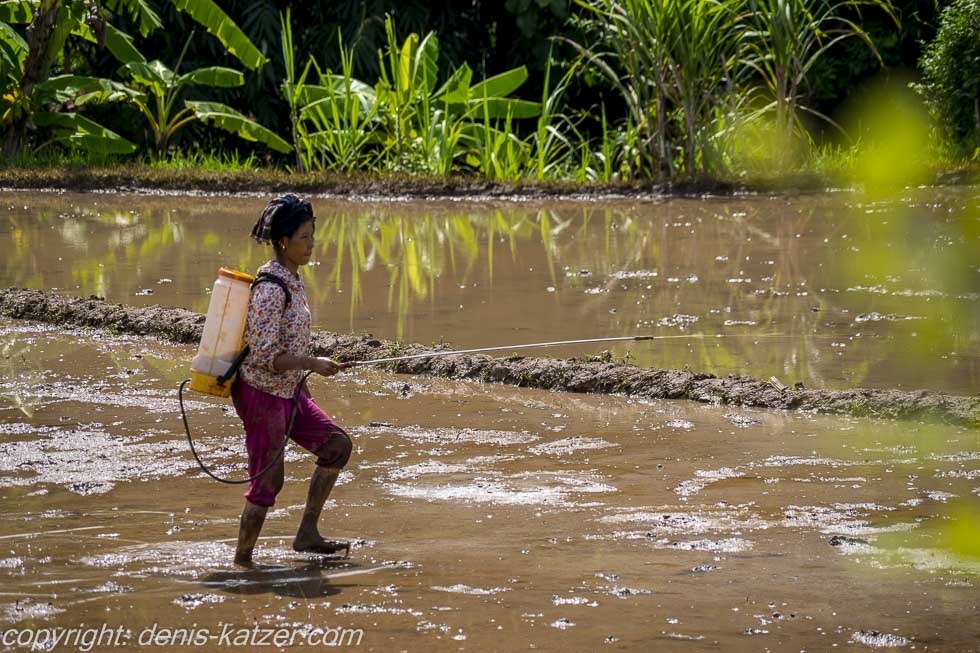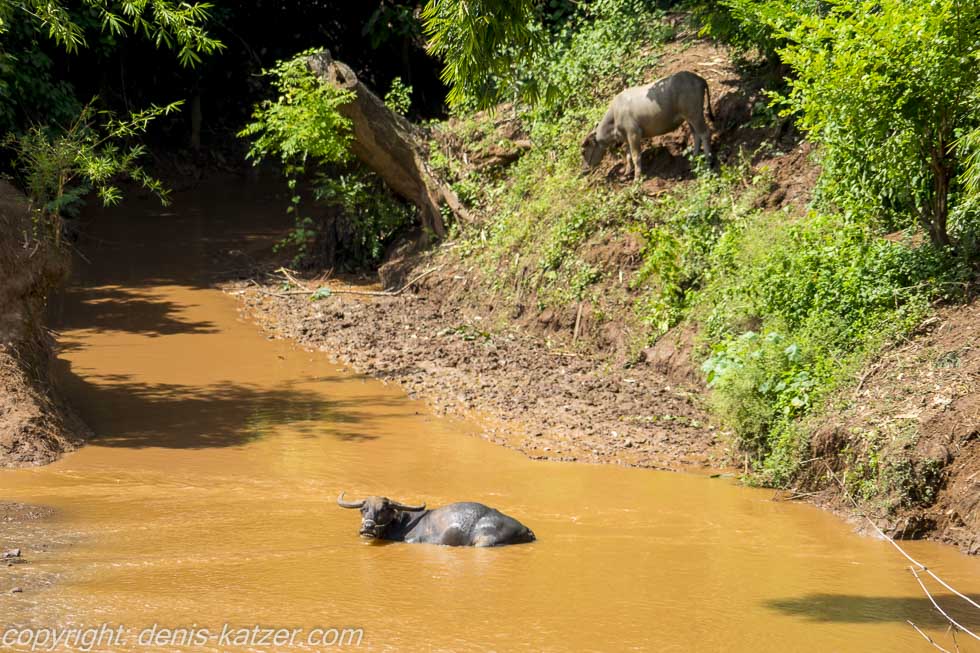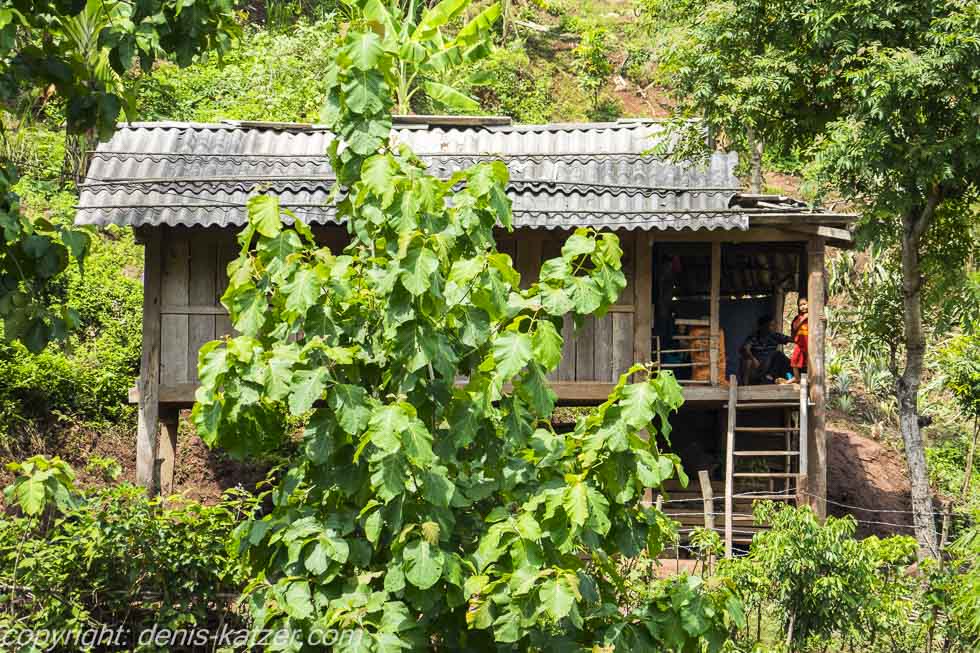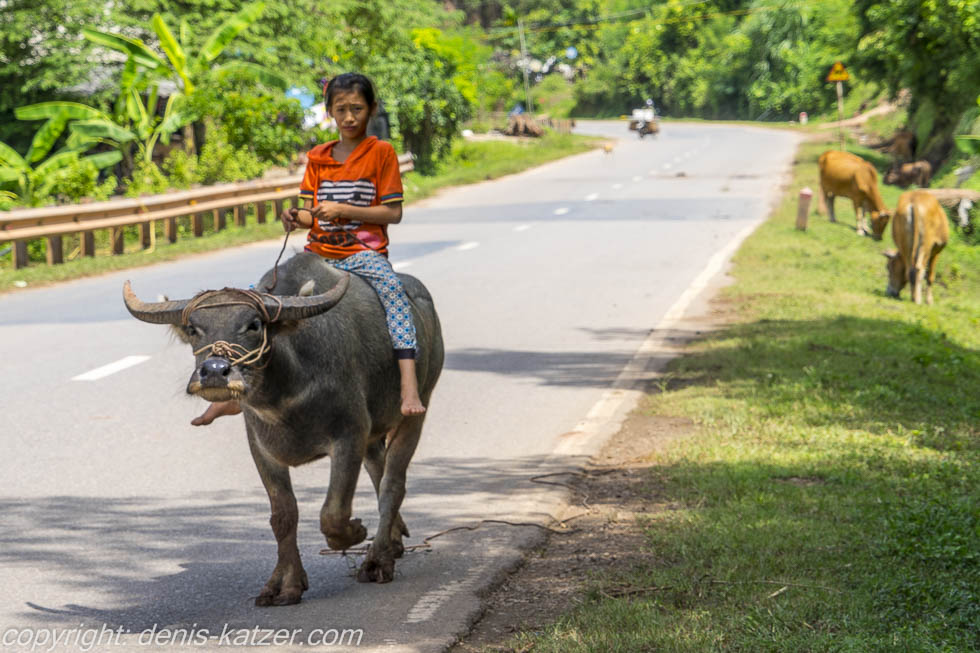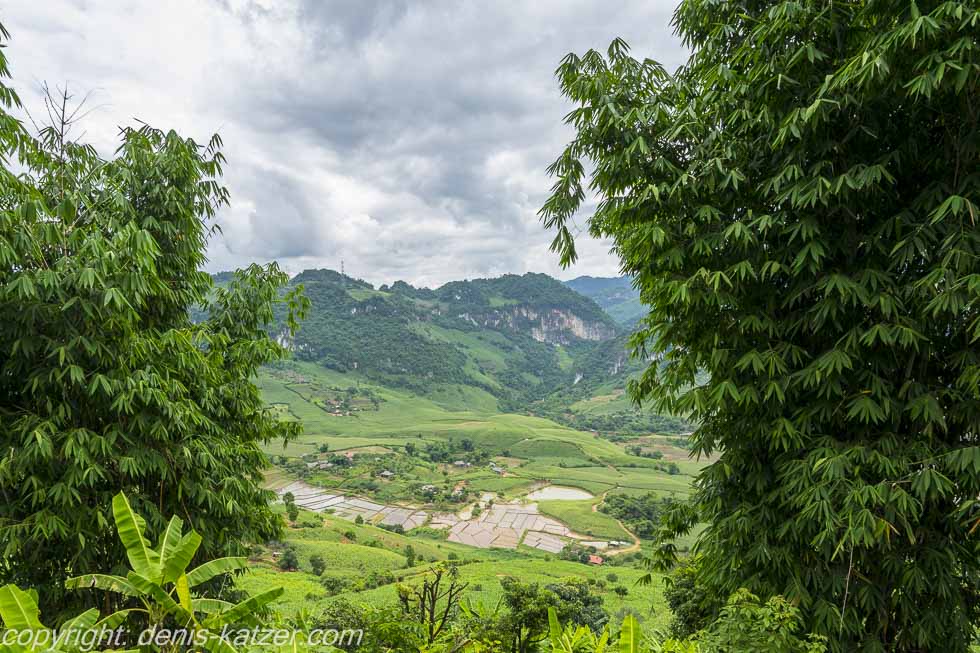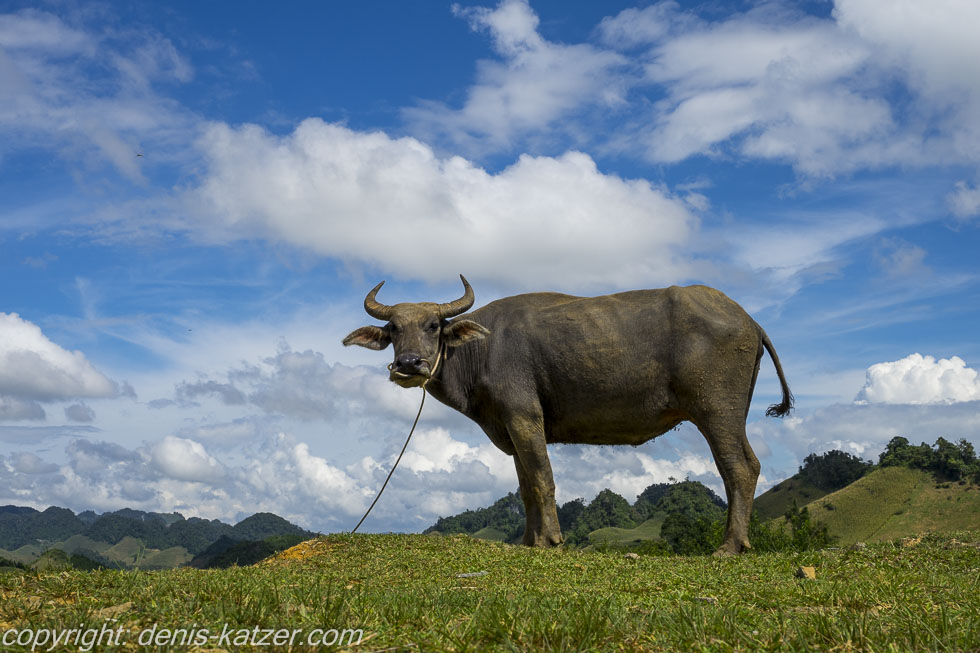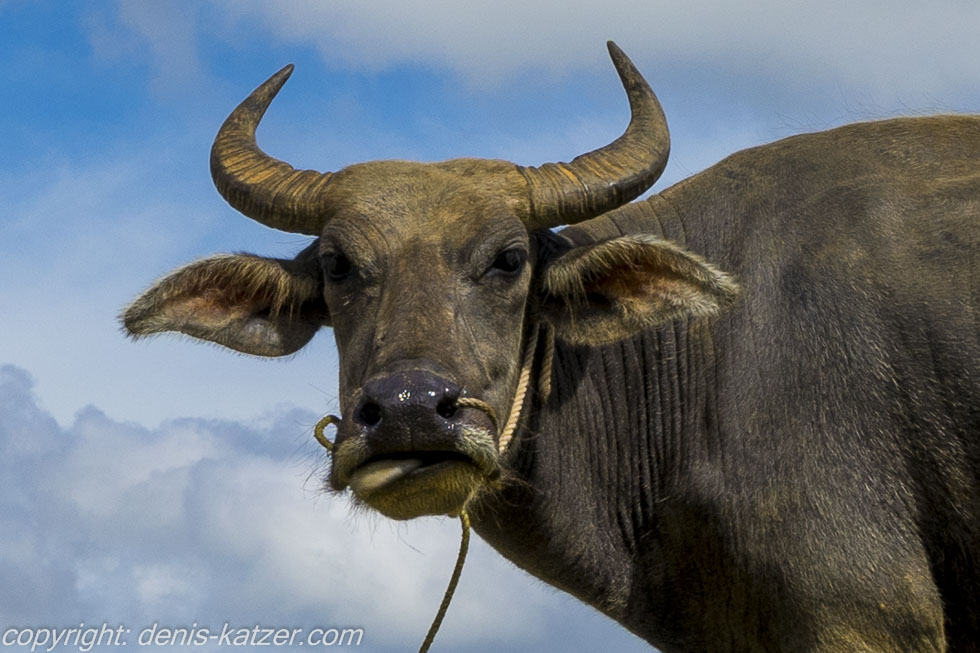
What kind of beings are we humans?
N 20°46'48.8'' E 104°50'12.3''
Date:
30.07.2016
Day: 399
Country:
Vietnam
Location:
Lonely guest house
Latitude N:
20°46’48.8”
Longitude E:
104°50’12.3”
Daily kilometers:
83 km
Total kilometers:
18,105 km
As the crow flies:
64 km
Average speed:
19 km/h
Maximum speed:
55.5 km/h
Travel time:
4:17 hrs.
Soil condition:
Asphalt
Maximum height:
1.250 m
Total altitude meters:
54.487 m
Altitude meters for the day:
1.266 m
Sunrise:
05:33
Sunset:
6:40 pm
Temperature day max:
35°C
Temperature day min:
24°C
Departure:
9:45 a.m.
Arrival time:
4:30 pm
(Photos of the diary entry can be found at the end of the text).
The owner of this guesthouse is also downright infatuated with Ajaci. He strokes it incessantly, takes photos of it from all angles and is downright proud to be photographed with the big white wolf. He then immediately publishes the picture treasures on his Facebook page and is delighted with the many comments from his friends. It’s crazy, some people love to eat dog meat and for others they are beloved family members. Some tie their dogs to short chains all day long, while others are allowed to enjoy their freedom. We are repeatedly overtaken by pig transporters on the journey. The squealing of the crammed animals, which slide back and forth on their own excrement as they sway, is terrible. I can almost hear the tormented creatures calling for help. It’s really bad when we hear their death cries, which come out of many a farmyard just before they are slaughtered, or when a piglet or a large sow breathes its last in front of a restaurant. Why are we humans allowed to inflict such suffering on animals? I don’t understand it. We kill our fellow creatures, eat them and sometimes even torture them beforehand. We do the same with our Mother Earth. What kind of ignorant, self-aggrandizing, egotistical, horrible beings are we? I pedal furiously. I would love to be the avenger of all tormented creatures. But revenge doesn’t help either. Aggression generates counter-aggression. The only thing that really helps, at least I’m convinced of that, is education and constant information. Only if we humans know that animals also suffer and endure pain will humans put an end to this heinous crime in future and curb their greed for profit. At least I hope so.
Suddenly the road is closed. A policeman waves the vehicles to the side of the road with a serious face. The reason is a serious accident that must have happened recently. A crane is in the process of pulling the completely demolished driver’s cab of a truck out of the back of a tanker. People work with simple tools to separate the wedged giants from each other. Petrol drips from the pipes while a spectator smokes a cigarette just a few meters away. “It’s madness,” I say to Tanja when I get back to the bikes and tell her about the explosive danger ahead of us. “It’s a good thing we didn’t get here 10 or 20 minutes earlier. Who knows if we would have been caught then,” she says. “Well, there’s usually a point to everything,” I reply, thinking about how we weren’t satisfied with our late start today. Tuuhht! Tuuhht! Tuuhht!, it sounds incessantly. The mopeds with their terribly loud horns make their way through the barrier. Although a policeman stops them with obvious anger, they speed past him as soon as he turns his back on them. The drivers then desperately try to avoid the scene of the accident across the fields soaked by the rain. Some of them get stuck in the mud. Then they dismount and join forces to push their scooters through the sticky earth. In the end, she and her vehicle are completely filthy, but the journey can continue. “Just like here in Europe. No one has time,” I say.
Just 20 minutes later, the narrow pass road is cleared and we can continue our journey through the still beautiful landscape. It’s getting warmer all the time. We now wear long-sleeved shirts to protect our skin from the strong sun. As soon as we stop to take a photo, the sweat starts pouring down our faces. Sitting on the bike again and being cooled by the wind is pleasant. Like every day, we head for the mountains. We wind our way up to 1250 meters. The exertion makes us sweat like Scandinavian moose lost in a summer desert during the winter. In the capital Hanoi, it is currently over 42 degrees in the shade. “You can cut the humid, tropical air with a knife,” a Vietnamese woman complained to us, delighted with the pleasant climate here in the mountains. We buy 1 kg of fresh avocados for 30,000 dong (€1.20) at one of the street stalls, which we happily eat for breakfast. I love avocados just as much as the king fruit mango. The fruit with its sometimes wrinkly skin, which originated in tropical Central America, was already cultivated 10,000 years ago by the Aztecs and other peoples living there. The avocado was first introduced to the Caribbean, Chile and Madeira by the Spanish.
As it is only about 200 kilometers from here to the 6.4 million metropolis of Hanoi, traffic is picking up again. More and more trucks and cars are crowding onto the road. It’s crazy how the collar-like arms of the stress of such a hectic city reach into the land.
“Here’s the way to Homestay Hua Tat!” I shout, happy to have reached our destination for the day. We leave the main road and turn onto the path that leads us into a valley. “There’s supposed to be a homestay there?” wonders Tanja. “I discovered it on Google maps,” I reply. We meet a few children who don’t greet us with their usual “Hello”. “They’ve probably seen too many tourists here,” I suspect. Then one of the wooden houses on stilts actually appears. A man shovels sand into a wheelbarrow and ignores us just as he did the children a few minutes ago. “That’s strange. Wait here for me, I’ll see if the homestay is still in operation,” I say, putting my bike on the stand. “Can you spend the night here?” I ask the sand shoveler. Without comment, he points to the stilt house. I follow a narrow path lined with tropical plants. Sssssh. A snake winds its way through the greenery and disappears under a bush. Climbing a few steps, I end up in the lower open part of the stilt house. If it were a local farmer’s house, there would probably be a water buffalo munching on its ruminations, a couple of pigs grunting, a moped leaning in the corner and lots of nondescript stuff standing around. In this case, however, the place is clean, tables and chairs are lined up waiting for guests, old barrels, baskets and grinding stones hang or stand around and show the interested visitor the tools with which the poor rice farmers still work today. “Hello, hello, is anyone here?” I call out. The definable, indefinable screeching of a video game can be heard from a smartphone loudspeaker. A three-year-old child appears from behind the wooden counter. Because of the obvious excitement of the virtual game, it doesn’t grab me. “Xin chào” (hello), a man in traditional mountain tribe clothing greets me with an open laugh. I learn that we can sleep here for 100,000 dong (€4) per person without breakfast. The man leads me to the second floor. In a large, airy room without a single piece of furniture, you can sleep on the bare wooden floor. As we are the only guests, I try to negotiate the price. Not a chance. Back at Tanja’s, we sit in the shade of a tree and consider whether we want to stay. “When you consider that you can get a hotel room with air conditioning for 250,000 dong (€10), sometimes even with breakfast, it’s relatively expensive here. But maybe you should see for yourself if you like it,” I say. “Is there a safe place for the bikes?” “I haven’t seen anything. I also don’t think Ajaci is allowed in the dormitory,” I say. “Well then, let’s keep driving. We’ll find something,” Tanja replies wearily. “Can you still do it?” I ask, a little worried. “Sure, a few kilometers are always possible.” We are just about to turn our roadtrains around to push them back up the hill when a modern jeep stops next to us. Rich Vietnamese from Hanoi get out and greet us. We immediately get talking about Ajaci and our e-bikes. “What a pretty dog,” says a fashionably dressed woman. We answer your questions about where from and where to. “Unbelievable, and you really cycled from Europe to Vietnam?” “Yes,” answers Tanja, whereupon we are bombarded with countless more questions. “They must be hungry and thirsty. Can I offer them some fruit? Or something to eat?” she asks anxiously. “No thanks, we’ve just eaten”, we fib and ask if she knows if there is another hotel or homestay nearby. “Oh, I’ll call my husband. He’s working on a big project in the area. If anyone knows, it’s him,” says the woman and pulls out her smartphone.
“It’s over there!” I shout, pointing to a house that looks like a hotel. Just five kilometers after the homestay, we put our e-bikes on the stand and ask if we and our dog can stay. Although this guesthouse doesn’t have a single guest either, and you could be forgiven for thinking that the owner is courting any business, we have to negotiate for 20 minutes until everything is finally sorted out. The bikes are allowed in the small kitchen next door, the trailers under a small covered veranda and Ajaci is tolerated in the room. Because the owner, who looks like she’s just stepped off the cover of a fashion magazine, is terrified of Ajaci, we have to move into the last room on the top floor. This is the furthest point from the reception. While I unload the bikes, stow them in the kitchen and lock them up, Tanja drags the equipment back upstairs. The prima donna of the house doesn’t help her. She is having her friend stick rhinestones on her painted toenails and comments on our every move, giggling childishly.
In the evening, we are the only guests in the simple hotel restaurant next door. Starlet is in the kitchen cooking. Obviously without much joy, as the omelette is burnt and the soup is only lukewarm…
If you would like to find out more about our adventures, you can find our books under this link.
The live coverage is supported by the companies Gesat GmbH: www.gesat.com and roda computer GmbH http://roda-computer.com/ The satellite telephone Explorer 300 from Gesat and the rugged notebook Pegasus RP9 from Roda are the pillars of the transmission. Pegasus RP9 from Roda are the pillars of the transmission.
